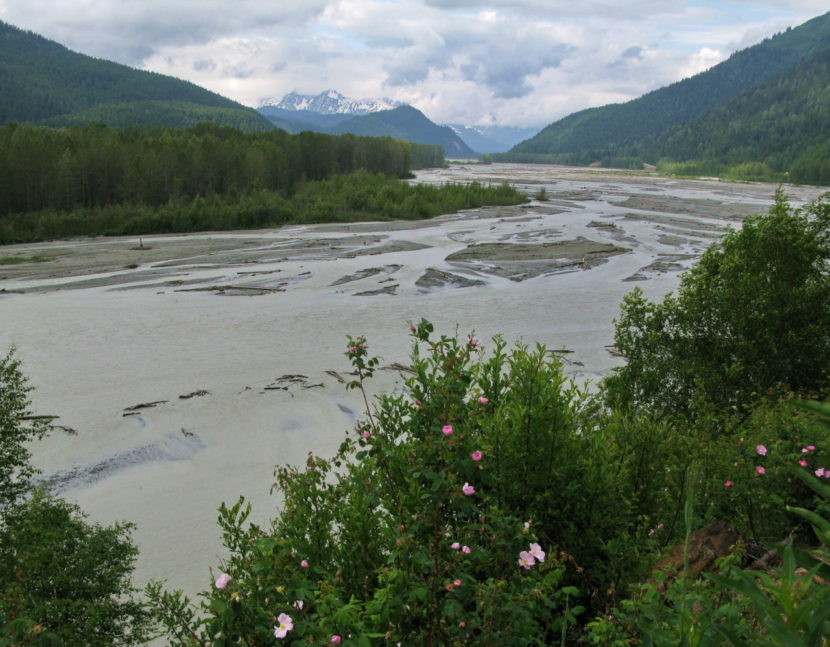
Gov. Bill Walker wants to “press the reset button” on bills that would require legislative action to grant a body of water the highest level of protection. Walker himself introduced the bills, which set up a process for nomination and evaluation of what are called Outstanding National Resource Waters.
One of four pending nominations in Alaska is for the Chilkat River. The bills have gone through multiple committee hearings, but now Walker wants to put them aside to work toward a more “broadly acceptable” proposal.
Walker said Senate Bill 163 and its companion House Bill 283 are the only pieces of legislation he’s taken this kind of effort to put on hold this session.
“It became evident to us that we had not spent enough time with various constituent groups in preparation for this,” Walker said. “We thought we were creating a more public process, obviously either we weren’t or a lot of folks felt we were not doing it the correct way, so we said, well, let’s push the reset button and start this process over again.”
Walker wrote letters to House Speaker Mike Chenault and Senate President Kevin Meyer asking for their cooperation. Walker said both have agreed to honor his request.
The bills at question stem from the federal Clean Water Act, which mandates states have a procedure to evaluate Outstanding Resource, or Tier 3, nominations. If a water body gets that level of protection, discharges that would significantly lower the water quality are prohibited.
Conservationists and some Native groups say Tier 3 protections would protect important salmon habitat, among other benefits. But development proponents such as the Alaska Miners Association say it would be overly restrictive of industry.
Walker’s bills proposed giving the power to approve or deny such nominations to the legislature. But many people spoke against that decision, saying it would politicize what should be purely scientific judgments. Alaska Center for the Environment spokesman Louie Flora was one them.
“The primary problem that we see with having the legislature call the final shot on Tier 3 designations is that it creates a white hot political debate instead of a stakeholder discussion,” Flora told the Senate Resources Committee.
The Senate and House committees did not change the bills to move authority away from the legislature. But Walker said, that’s a consideration he will make when thinking more about this legislation. He said it’s still up for debate whether lawmakers or a state agency, like the Department of Environmental Conservation, should rule on Tier 3 nominations.
“We want to sort of really start from scratch and come back and listen to folks and we’ve got a lot of ideas that we have to see if we can incorporate those into it,” Walker said. “We have to certainly stay within the bounds of our constitution and statutes.”
Alaska’s constitution was one of the reasons DEC has given for why the legislature should have authority in Tier 3 judgments. The constitution states that the legislature shall provide for conservation of natural resources belonging to the state. DEC staff have also said that because Tier 3 protections could have far-reaching impacts on land use near the water body, the decision should be up to lawmakers.
The Senate Resources and House Fisheries committees have amended the Tier 3 bills in recent weeks. Senate Resources added fees the nominator must pay for DEC staff time in considering applications. House Fisheries proposed a nine-member advisory board to evaluate nominations. Whether any of those changes will materialize when the Tier 3 bills are introduced in a future session is uncertain.
“Well they could, we’ll see,” Walker said. “Again, listening to the various user groups that are concerned about it, if it makes sense to have those in there. But I’m not starting off with any preconceived anything as to what it’s going to look like.”
Because Alaska is required by the federal government to have this process figured out, Rep. Charisse Millett asked DEC Commissioner Larry Hartig at a recent meeting what would happen if the bill didn’t become law this session. Hartig said he has talked to the EPA about it.
“EPA would not want to come in and try to override the state,” Hartig said. “They recognize that we’re in the process of trying to develop the process for designation of Tier 3 waters.”
Walker echoes that reassurance in his letters to the Senate President and House Speaker. He said the EPA’s intent is to give the state the time it needs to come up with a process.
Meanwhile, the groups that have nominated four Alaska water bodies for Tier 3 protection will have to wait a while longer. The nominations in limbo are for the Chilkat River in Haines, the Yakutat Forelands, the Bristol Bay Watershed and the Koktuli River.
